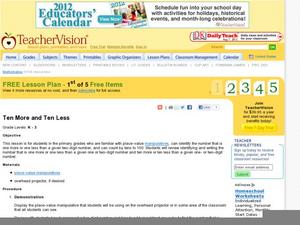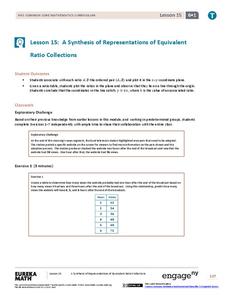Curated OER
Classification
Students investigate how different types of food can be classified then counted. In this sorting, arranging, and classifying lesson plan, students explore how to group foods based on commonalities. Students are asked four questions which...
Curated OER
Ten More and Ten Less
Get learners to analyze two-digit numbers based on place value, and use manipulatives to add and subtract both 1 and 10. A place value chart is available, and you can project it during guided practice. Through visualizing...
Curated OER
Adding up the Pizza
Although not the best in terms of grammar, this addition word problem will work just fine as a guided warm-up. Because the explanation is at the bottom of the page, project this for the class, having learners do it independently, then...
Curated OER
Base Ten Blocks - Counting Units (A)
In this math learning exercise, students are given 8 sets of counting blocks. Students are asked to count the blocks and tell how many "units" are in each group.
Curated OER
Counting Small Quantities
In this math activity, learners practice completing the problems using the skill of counting up to 20. The sheet is intended as a teacher's guide.
Curated OER
Using Tens Frames for One to One Counting
Pupils complete a variety of exploratory exercises regarding counting through 10. They recognize the numbers 0-10 as represented using the quinary pattern on the tens frames. They are able to visualize the patterns for future practice...
Curated OER
Counting Geometric Shapes 1-9
In this math worksheet, students count the number of geometric shapes in each of 4 squares. They circle the correct number of items in each group and color the circles, squares, triangles, and diamonds.
Curated OER
So Many 7s and8s
For this counting to 7 and 8 worksheet, students use two different colored crayons and color the balloons to show different ways to make 7 and 8. Students then write an equation for each problem and finish with one word problem for the...
Curated OER
Money Counting Worksheet
In this coin identification worksheet, students look at 4 groups of coins pictured on the left and 4 money values listed on the right. Students draw a line to match the groups of coins to their monetary amount.
Curated OER
Equations at the Pond
In this math equations worksheet, students look at each picture of the frogs, fish, bugs, and turtles and write an equation for each problem. Students finish by drawing a picture of their own pond and writing an equation for it.
Curated OER
Counting Birds Worksheet
In this bird math worksheet, students count the number of different birds in each group and write that number in the provided blank space.
Curated OER
Make-Your-Own Math Practice
Students create their own math practice book. In these homemade book lessons, students create their own counting, number, and shape pages. When the pages are complete, they are bound together in a book.
Curated OER
Count the Stars
In this counting worksheet, students count colored stars, writing the total amount of each color at the bottom of the page Answers are included on page 2.
Curated OER
Summer Counting Worksheet
For this counting worksheet, students look at 4 groups of pictures with a summer theme and circle a given number of items.
Curated OER
Count the Objects and Circle the Number
In this early childhood counting to 10 activity, students count the 3 groupings of objects and identify the total number in each group.
Curated OER
Counting by 4's
In this counting worksheet, students count groups of objects by three, writing the numbers 1, 2, and 3 beneath the objects. Worksheet has a total of 3 rows, 6 objects each.
Curated OER
How Many Legs Does Your Animal Have?-- Class Graph
In this science and math worksheet, students plot information about their chosen animal on a bar graph. Students indicate how many legs their animal has. This appears to be intended for a large group of students in comparing animals.
Curated OER
How Many of Each Coin Do We Have in Our Bag?-- Class Bar Graph
In this math worksheet, students participate in a group project to record the kind of coins they pick at random from a bag. Students record the data on this classroom bar graph.
EngageNY
A Synthesis of Representations of Equivalent Ratio Collections
Make all the ratio representations fit together. The 15th segment in a series of 29 presents ratio problems to solve. Scholars use a variety of representations to respond to the questions. The problem set has pupils show how the...
EngageNY
Comparison Shopping—Unit Price and Related Measurement Conversions
Speed up your scholars' understanding of ratios. Class members compare ratios related with speeds presented in different representations. They then use the unit rates to make the comparisons.
WakeGOV
Plastic Sight Words
Plastic math? Have young learners count and name the number of plastic items in their centers. Kindergartners match sight word cards to the number of plastics in a given group, while learning that plastics come in all different shapes,...
August House
The Ogre Bully
English language arts, math, science, dramatic arts, and cooking; this lesson has it all! In this multidisciplinary resource, your scholars will take part in a read aloud of The Ogre Bully by A.B. Hoffmire and have a grand...
EngageNY
End-of-Module Assessment Task: Grade 8 Module 1
It's all in the numbers. Determine your pupils' level of understanding of scientific notation using this assessment task. The final lesson in the series assesses scholars on the application of scientific notation in real-life...
EngageNY
Mid-Module Assessment Task: Grade 7 Mathematics Module 5
Determine the probability that the class knows probability. The three-question assessment presents problems with finding the sample space and the probability, theoretical and experimental, of a variety of situations. Pupils also describe...

























